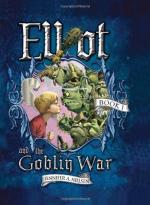“Oh, Mysie,” he said brokenly. His voice refused to go further and he bent his head upon the bed, trying hard to control himself and keep from breaking down before her.
“I’m awfu’ vexed, Rob,” she said, after a while. “It was a’ a mistak’ an’ naebody’s to blame. I ought to hae kent better mysel’,” and she paused again for breath. “I—I should hae kent better, that nae guid could come—oot o’ it—I was just carried awa’. Dinna ever blame lasses—nor men either, when things happen. They—they canna help themsel’s—” and here again she paused for breath, gasping and fighting at every word.
“It’s a’ a mistake, Rob, an’ I think it’s a’ in the way folk look at thae things.” Another pause, while her chest heaved and panted. “Maybe we dinna look at thae things richt,” she again resumed. “We—we mak’ mistak’s and canna help oorsel’s; but God dinna mean it as—as a mistak’. It’s a’ because we think it is. Everything’s richt—but we mak’ them wrang in the way we look at them. It wad hae—been a’ richt—in oor mind, if I had been married afore—afore it happened—but because we werena married—it was wrang. It’s a’ a mistak’ Rob, a’ a—” and a burst of coughing nearly choked her and a flood of blood began to gurgle in her mouth.
Robert grew alarmed and lifting a cloth began to wipe the blood from her mouth, looking on her so concerned and anxious that she tried to smile to him to reassure him.
Presently she lay back with eyes closed and her hand limp in his. A wild fear took possession of him as he looked upon the scarcely moving breast, a fear which seemed to communicate itself to the sufferer, and she opened her eyes again, but the voice was weak and very far away.
“Dinna be angry wi’ onybody, Rob. It was you I liket, it was you I wanted—but it was a’ a mistake.”
“I’m no’ angry, Mysie,” he said stifling his sobs, his tears falling upon the white thin face. “Oh, Mysie, I’m only vexed. I’m only vexed aboot the hale sad business. There now, dearie,” he said bending low over her and kissing and stroking the pallid brow and caressing the face so dear to him. “There noo, I’m no’ angry. You’re mine, Mysie. You’ve always been mine, an’ I’m no’ angry. But oh, I love you, Mysie, an’ it’s breaking my heart to part frae you. Oh, God!” he groaned in agony. “What does it a’ mean? I canna’ bear it,—I canna’ bear’t,” and a wild burst of grief swept over him as he flung his head and arms upon the bed in a vain attempt to control his sobbing sorrow.
A long pause—then the white hand was raised and crept slowly over his shoulder, working its way among the thick shaggy hair of his head as the fingers strayed from curl to curl, patting him and soothing him as a child is soothed by a mother’s hand. It rested upon his bent head and the eyes opened again.




